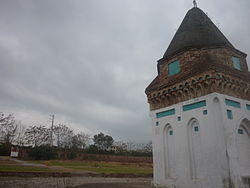
Back الحسن بن علي الأطروش Arabic Hàssan al-Utruix Catalan ناصر للحق اطروش Persian ناصر للحق GLK ناصر کبیر PNB Hasan el-Utruş Turkish
| Hasan al-Utrush | |
|---|---|
| Emir of Tabaristan, Zaydi Imam | |
 Tomb of Hasan al-Utrush in Amol | |
| Reign | 914–917 |
| Predecessor | Samanid occupation |
| Successor | Hasan ibn Qasim |
| Born | c. 844 Medina |
| Died | January/February 917 Amol |
| House | Zaydid dynasty |
| Religion | Zaydi Shi'a Islam |
Abū Muḥammad al-Ḥasan ibn ʿAlī ibn al-Ḥasan ibn ʿAlī ibn ʿUmar al-Ashraf ibn ʿAlī Zayn al-ʿĀbidīn ibn al-Ḥusayn (Medina, c. 844 – Amul, January/February 917), better known as al-Ḥasan al-Uṭrūsh (Arabic: الحسن الأطروش, lit. 'Hasan the Deaf'), was an Alid missionary of the Zaydi Shia sect who re-established Zaydi rule over the province of Tabaristan in northern Iran in 914, after fourteen years of Samanid rule. He ruled Tabaristan until his death under the regnal name of al-Nāṣir liʾl-Ḥaqq ("Defender of the True Faith"), and became known as al-Nāṣir al-Kabīr ("al-Nasir the Elder") to distinguish him from his descendants who bore the same surname. His grandfather Al-Ḥasan is the grandson of ʿAlī Zayn al-ʿĀbidīn'son ʿUmar al-Ashraf. He is still known and recognized as an imam among the Zaydis of Yemen.[1]